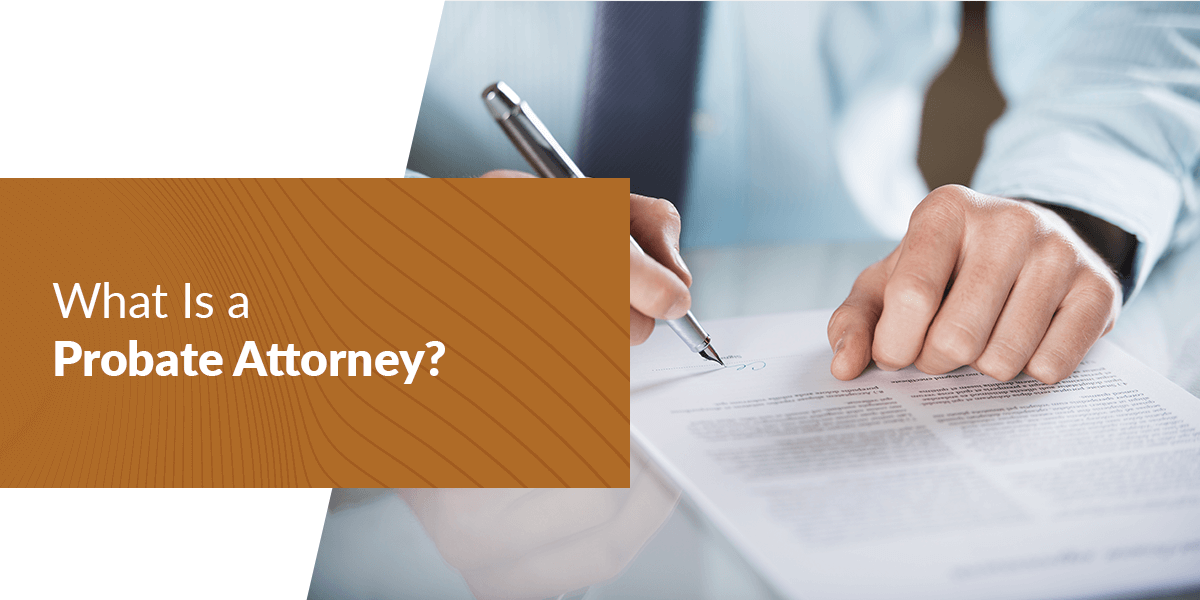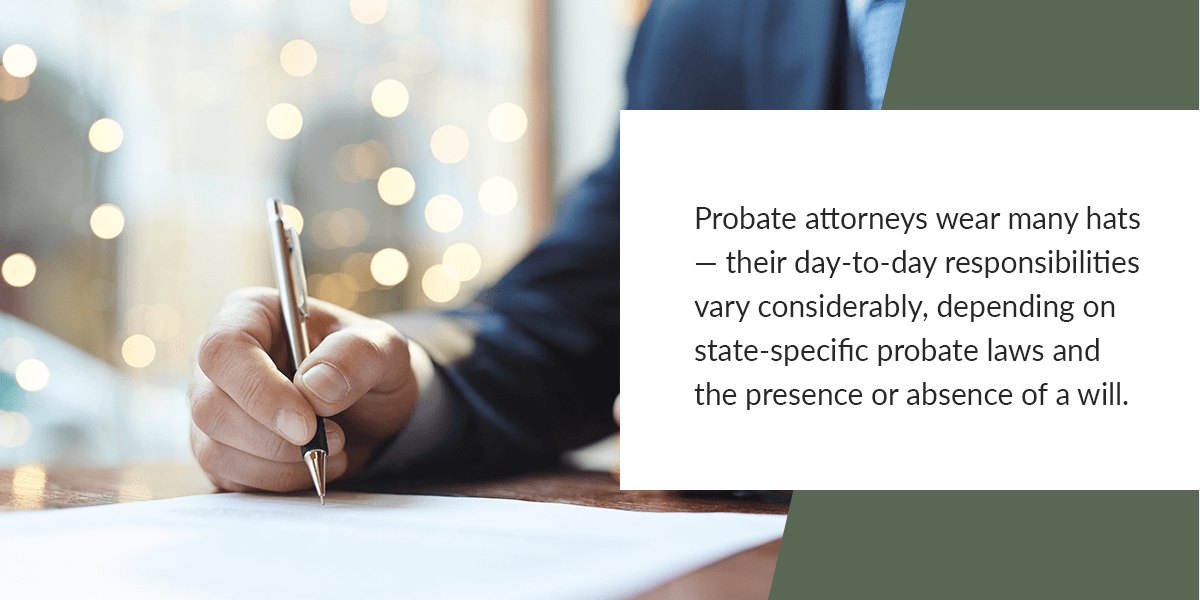
After an individual passes, their heirs are required to go through probate, the legal process of distributing someone’s assets to the appropriate parties through probate court. Probate court is part of the judicial system responsible for doling out all property, debts and belongings of the recently deceased.
This system may appear is subject to many setbacks and delays that can prolong the probate process significantly. These issues can cause probate to take anywhere from several months to two years.
Going through probate alone is undoubtedly challenging for those who have never navigated the process before, which is why many beneficiaries turn to probate lawyers to assist them.
If you’re considering contacting a probate attorney to help you with the inheritance process, it’s vital that you understand who they are, what they do and whether hiring them is the best course of action for you. In this guide, we’ll answer all of these questions and more so you can feel informed and prepared to undertake the probate process.
What Is a Probate Lawyer?
A probate lawyer is an attorney responsible for settling someone’s estate after their passing. These professionals assist beneficiaries and estate executors, helping them work through probate.
All probate attorneys must have a state license and law degree to practice, while board-certified lawyers must receive a certification from the Estate Law Specialist Board. To earn these credentials, individuals must practice for a minimum of five years, take at least 12 hours of classes per year for three years and pass an exam.
With their prolonged training and studies, probate lawyers gain extensive expertise on trust and inheritance laws and how to govern them. They’re highly knowledgeable of the most current requirements and even have specialized tax knowledge about inheritance and estates. Probate lawyers are also qualified to help in the estate planning process but tend to charge high fees for basic services like writing a will, creating a trust and establishing guardianship.
How much a probate attorney charges for their services varies — they can charge either a flat fee or by the hour. Their rates may also depend on the size of the deceased’s estate, the value of their assets and the number of heirs involved with the estate.
What Does a Probate Lawyer Do?

Probate attorneys wear many hats — their day-to-day responsibilities vary considerably, depending on state-specific probate laws and the presence or absence of a will. An individual’s estate plan generally dictates the direction of the probate process.
Probate lawyers help settle estates by helping the executor and beneficiaries with areas like:
- Life insurance policies: Lawyers deal with life insurance policy matters, like collecting and managing the proceeds.
- Inheritance taxes: Probate attorneys determine the inheritance taxes associated with an heir’s share of the estate and govern the payment process.
- State and income taxes: If an estate has any applicable state or income taxes due, the probate attorney is accountable for resolving them.
- Estate assets: Your attorney will identify all assets from the estate and secure them.
- Checking accounts: A probate lawyer is in charge of opening and managing the estate’s checking account.
- Property appraisals: An attorney will determine how much real property is involved in the estate, or the deceased’s land and all things attached to it, by organizing property appraisals.
- Debts and bills: If an estate has any remaining debts or unpaid bills, a probate lawyer will figure out how to pay them.
- Court documents: Your lawyer is responsible for preparing, completing and filing all court documents and paperwork.
- Asset transfers: A probate lawyer will transfer a deceased’s assets to their heirs by retitling them in the beneficiaries’ names.
- Final disbursements: After all of the estate’s expenses and taxes are paid, a probate attorney will make final asset distributions to the appropriate parties.
- Court appearances: Lawyers accompany heirs to all of their court appearances to represent them.
- Will: When there’s a will, a probate attorney will often verify that it’s valid.
- Beneficiary disputes: In cases with multiple heirs, probate lawyers will often settle arguments over the estate.
An Attorney’s Role When There Is a Will
A probate attorney’s duties differ depending on whether the person who’s passed away left a will behind. The best-case scenario is if the deceased individual drafted a valid will before they passed, which means they died testate.

When there’s a will involved, a probate lawyer will advise the estate executor and beneficiaries on relevant legal matters, like ensuring that the will is valid. To verify that a will is valid, an attorney will ensure the deceased had the intent to create it, was of sound mind and body when establishing it and was not coerced or under duress. Older adults with degenerative conditions like dementia are particularly vulnerable to influence by individuals pushing to obtain a share of the estate.
The lawyer may also check to confirm that the will was signed by the appropriate parties, who must be at least 18 years old.
An Attorney’s Role When There Is No Will
An individual who dies intestate passes without having written and signed a legal will. In these instances, the estate is distributed based on intestacy laws established in the state where the deceased’s property resides. Intestacy laws determine who will inherit the deceased’s assets — typically their relatives or a surviving spouse.
A probate lawyer often helps with intestate cases by helping the state’s administrator distribute the assets according to state law. Because they are bound by intestacy laws, they may have to go against the deceased’s wishes or the needs of their family members when dividing the estate.
If a relative wants to act as the estate’s administrator, they must first get renunciations, or legal statements from the deceased’s other family members, declaring that they give up their rights to administer the estate. A probate attorney will often collect and file these documents with the probate court and help the administrator with the probate process.
Do I Need an Attorney for Probate?
While it’s helpful to hire a probate attorney to assist you during probate, it’s not always necessary. Because these lawyers can cost heirs a lot of money for their services, it can be beneficial to go without one if possible.
You should consider all of the following factors when determining whether hiring a probate lawyer is the best thing for you.
State Laws
The complexity of the probate process often depends on the state where the deceased lived. For instance, states that follow the Uniform Probate Code (UPC) have more straightforward rules and procedures than those that don’t. The National Conference of Commissioners on Uniform State Laws (NCCUSL) created these regulations to streamline and standardize the probate process.
If your state has relatively simple probate laws, you may be able to navigate the process without a probate lawyer. But probate is complicated and time-consuming, even with the UPC.
Presence of a Will
Probate is much easier to manage with a will than it is without one. Without a will, the probate court becomes even more heavily involved in the process, complicating matters more. You’ll also need someone to determine who the deceased’s assets will go to. In situations like these, a probate lawyer can be useful.
Even if the deceased left a will behind, it may be improperly witnessed or signed, unclear or non-specific, warranting further investigation and decision-making from an experienced professional.
Estate Size
The more assets an estate contains, the more complicated the probate process. Larger estates with a lot of assets require many legal decisions, paperwork and discussions that can extend probate even further.
If your loved one’s estate is on the larger side, you may want to consider an attorney.
Beneficiary Relationships
During probate, the deceased’s family members must collaborate and decide various aspects of what will happen to the estate. Heirs don’t always get along in these instances, creating disputes that may warrant probate lawsuits and will contests. These situations lengthen probate and can cost the estate considerably.
If there are members of your family who don’t typically get along, you may need a probate lawyer to facilitate the process.
Types of Assets
The types of assets an estate includes impacts the complexity of probate. The more complicated the assets, the longer you can expect probate to take.
For example, if your loved one’s estate contains common assets like a house, bank accounts, household belongings and vehicles, you may not have to resort to hiring an attorney. On the other hand, more complicated assets that require special handling, such as commercial real estate and businesses, need professionals to manage, appraise or sell these types of property.
Federal Estate Taxes
Though most estates don’t owe federal estate taxes, larger ones occasionally do. If you find that your loved one’s estate owes taxes, you’ll need expert tax and legal advice from a probate attorney who will help you file an estate tax return.
Outstanding Debts
If the estate has enough money to pay all legitimate debts, such as the deceased’s funeral costs, medical expenses and final income tax, with enough left over to compensate heirs, you may not need an attorney to help you pay your loved one’s debts. If there isn’t enough money in the estate to pay the deceased individual’s debts, you should get legal advice before attempting to pay bills.
Questions to Ask a Probate Attorney

If you choose to hire a probate attorney to help you with probate, there are many crucial pieces of information you should have before selecting someone to represent you. All lawyers are not created equal, which means you’ll have to do some digging to ensure your attorney of choice has the skills, experience and knowledge to successfully manage your case. When you ask the right questions in advance, you can eliminate any unwanted surprises down the road.
When looking for an attorney to stand by you in probate court, try asking the following questions to get a complete idea of whether they’re the right fit for your needs.
What Is Your Area of Practice?
Verify that your probate lawyer has adequate expertise in probate law and estate planning. All lawyers have different backgrounds, which is why you should ask prospective attorneys what areas of law they practice. In most cases, lawyers who don’t focus on probate and estates don’t have the knowledge and experience necessary to execute these cases effectively, which can result in excessive delays.
How Long Have You Practiced Probate Law?
Even if your lawyer specializes in probate law or estate planning, it’s crucial to determine how long they’ve been in practice. As with any profession, the more experienced an individual is, the better they’ll be able to represent you. That’s why you should hire a seasoned attorney who can get the job done as quickly and efficiently as possible.
How Long Should I Expect the Process to Take?
Though the probate process is tedious and time-consuming with or without a lawyer, ask prospective attorneys when they estimate proceedings will be over. Some lawyers may be able to close the estate faster than others depending on how much experience they have. It’s also essential to consider time if the lawyer charges for their services hourly.
Have You Handled Cases Like Mine in the Past?
This question is vital for understanding how experienced your attorney is at handling cases involving similar circumstances to yours. Asking if a lawyer has represented clients in similar situations is particularly important if your case is complicated or involves a large estate. While no two cases are exactly the same, it’s still helpful to hire a lawyer who’s prepared to represent you in your given position.
Have You Ever Practiced Before the Court Where My Case Is Assigned?
Every judge and county has its own unique rules and handlings when it comes to probate court. You can expect a faster and smoother process with a probate attorney who has experience in the court where your case will take place and is familiar with the judge’s preferences.
How Much Do You Charge for Your Services?
Perhaps the biggest question for every heir is how much they’ll have to pay for a probate lawyer. All attorneys charge different rates and fees for their services, which is why it’s important to ask them upfront how much you can expect to pay. Will they charge an hourly rate, a flat fee or a contingency rate? Comparing the answers to these questions to your particular case will give you a good idea of how much your attorney will cost.
Skip the Probate Process and Get Your Inheritance Fast
You can forgo the lengthy and complicated probate process and get your inheritance money fast with a probate advance from Inheritance Funding. As the largest and oldest cash advance provider in the industry, we have the expertise to get you the cash you need immediately and at the lowest price — guaranteed. We make the process simple with a free consultation, estate review and instant funding without the risk of recourse for non-payment. Once you receive your money, your responsibility is over!
Contact us to schedule your free consultation today!






